|
|
|
Sort Order |
|
|
|
Items / Page
|
|
|
|
|
|
|
| Srl | Item |
| 1 |
ID:
163700
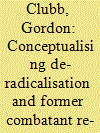

|
|
|
|
|
| Summary/Abstract |
Nigeria has recently joined the many states which have established de-radicalisation programmes. The article engages with debates on how the success of de-radicalisation can be ascertained given the substantial flaws of using individual-oriented recidivism rates as a measure. Many studies on de-radicalisation emphasise the need to consider the programme’s context to facilitate success, yet ‘context’ has been under-conceptualised and approached statically. The paper provides greater agency to ‘the context’ in distinguishing between the type of milieus former combatants are re-integrated into and how these emergent social relations shape the scope of de-radicalisation programmes, beyond the traditional over-emphasis on programme participant outcomes as measures of success. The Nigerian de-radicalisation programme has a broader function insofar as it provides former combatants with ‘scripts’ of disengagement and function as a brand, signalling to communities that former combatants have repented and are ‘better citizens, imbued with genuine nationalism’ that resonate with local communities.
|
|
|
|
|
|
|
|
|
|
|
|
|
|
|
|
| 2 |
ID:
163703
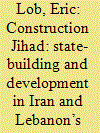

|
|
|
|
|
| Summary/Abstract |
Based on fieldwork in Iran and Lebanon, this article compares the Iranian reconstruction and development organisation Construction Jihad with its Hizbullah-affiliated subsidiary in Lebanon. Beyond shedding light on Iranian and Lebanese history and politics, this comparison offers insight into the transnational diffusion of a development organisation by a state actor to its non-state or quasi-state ‘client’ in the Muslim and developing world. Despite the distinct environmental and operational conditions of Iran and Lebanon, Construction Jihad similarly assisted a nascent Islamic Republic of Iran (IRI) and a fledgling Hizbullah with state-building. The latter consisted of consolidating coercive power against domestic and foreign opponents, increasing administrative capacity through service provision and post-war reconstruction, and strengthening the political and religious identity of citizens and constituents. Regardless of the differing contexts of Iran and Lebanon, Construction Jihad counter-intuitively possessed a similar organisational and developmental model in both countries that did not neatly conform to the dichotomous typologies in development studies. This seemingly contradictory model was largely faith based, exclusive, distributive and top down with certain decentralised, community driven and participatory elements.
|
|
|
|
|
|
|
|
|
|
|
|
|
|
|
|
| 3 |
ID:
163704


|
|
|
|
|
| Summary/Abstract |
This article draws on ethnographic research in Tanzania to interrogate the discourse of ‘public’ and ‘private’ in sub-Saharan irrigation development. It contrasts the complexity of social and political relations with narratives suggesting that ‘private’ is necessarily opposed and superior to ‘public’. We argue that support for models of private-sector development obscures access to and control over resources and can result in the dispossession of those least able to resist this. Different interests of ‘entrepreneurial’ individuals and corporate investors and the ways in which these relate to the state are also glossed over. Conversely, the failure of the ‘public’ cannot simply be read from the chequered histories of irrigation schemes within which public and private interests intersect in complex ways.
|
|
|
|
|
|
|
|
|
|
|
|
|
|
|
|
| 4 |
ID:
163699
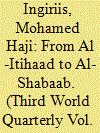

|
|
|
|
|
| Summary/Abstract |
External intervention has frustrated and continues to frustrate peace and stability in the Horn of Africa and Somalia, adding various adverse layers to an already complicated and complex conflict. The level of forceful military engagement intended for regional domination has profoundly affected negatively the efforts of peacebuilding and statebuilding in Somalia. This article examines how the earlier Ethiopian policies towards Somalia has reshaped the (post)-Cold War politics of the Horn. In doing so, it traces the roots of the Ethiopian intervention in Somalia vis-à-vis new non-state armed groups to chart the changing political dynamics of the conflict in Somalia. By using historical approach, the article argues that Ethiopia’s agenda is central to understanding why the ‘War on Terror’ has strengthened and subsequently midwifed armed militant movements (e.g. new insurgency groups) in Somalia, starting from Al-Itihaad to today’s Al-Shabaab. In focusing upon various regional actors and groups, the article moves from the emphasis of internal systems to external power structures, considering the wider historical and political factors in the region that must be closely examined if the regional and local conflicts are to be deeply understood. While it is a context-specific study, the article aims to contribute fresh perspectives and insights to ongoing discussions on the consequences of the Ethiopian intervention in Somalia.
|
|
|
|
|
|
|
|
|
|
|
|
|
|
|
|
| 5 |
ID:
163708
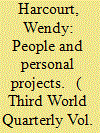

|
|
|
|
|
| Summary/Abstract |
In response to Juan David Parra Heredia’s criticism of her earlier article about her use of post-development as a tool in teaching development studies, Wendy Harcourt reflects further on how the course analysed in 2016 has evolved in the last three years and corrects the misreadings of the pedagogical position-taking by the teachers in the course.
|
|
|
|
|
|
|
|
|
|
|
|
|
|
|
|
| 6 |
ID:
163707


|
|
|
|
|
| Summary/Abstract |
This article makes a critique of using Post-Development as a tool in teaching an introductory course in development studies. Such a debate was initiated by Harcourt in a previous issue of Third World Quarterly as she reflected on her teaching experience in a European Institution. Harcourt concludes that the lack of engagement of some of the students in the course reflects the unwillingness of privileged middle-class pupils to challenge western lifestyles. I draw on a critical realist meta-theory about the process of learning in higher education to challenge the ontological support of that conclusion and invite her to reconsider her teaching strategy.
|
|
|
|
|
|
|
|
|
|
|
|
|
|
|
|
| 7 |
ID:
163701


|
|
|
|
|
| Summary/Abstract |
China tends to be a dominant figure in the literature on global land grabbing. It is either cast as a major land grabber in distant places such as Africa, or as a key player in crop booms elsewhere because it provides for massive market demand, such as for soya from South America. These are all important issues and are well covered in the literature. However, the crop booms inside China that involve transnational capital and investors – and have provoked conflict around land politics – have been overlooked. Spotlighting the issue of land grabbing inside China reminds us that capital accumulation is principally interested in geographies and settings where it can generate profit – regardless of nationalities, boundaries, structural or institutional conditions. This paper hopes to contribute towards a more refined picture of global land grabbing.
|
|
|
|
|
|
|
|
|
|
|
|
|
|
|
|
| 8 |
ID:
163705
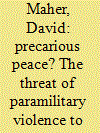

|
|
|
|
|
| Summary/Abstract |
This article provides an investigation into claims that paramilitary violence in Colombia can pose a threat to the peace agreement signed in 2016 between the Colombian government and the FARC rebels. These claims highlight the capacity for paramilitary groups to ‘spoil’ the peace deal. Hitherto, however, there is a lack of scholarly research to investigate the potential of paramilitary spoiling. Firstly, this article highlights the flaws in the government’s perspective that paramilitarism no longer exists in Colombia. Instead, the government argues that Colombia is plagued by criminal bands (known as BACRIMs). Secondly, through fieldwork interviews and questionnaires conducted in FARC demobilisation camps, together with descriptive data analysed through a uniquely coded dataset on violence in western Colombia, this article supports claims that successor paramilitary groups represent a key spoiler threat to the current government-FARC peace process. On the one hand, the paramilitaries can represent a direct spoiler threat by, for instance, violently targeting demobilising FARC guerrillas. On the other hand, successor paramilitary groups represent a key indirect spoiler threat, as paramilitary violence is exacerbating the root causes of the conflict that the peace deal seeks to address, with negative implications for the prospects for peace.
|
|
|
|
|
|
|
|
|
|
|
|
|
|
|
|
| 9 |
ID:
163706


|
|
|
|
|
| Summary/Abstract |
Studies on global assembly line workers showcase how gains women make are counteracted by physical, social and psychological problems stemming from long hours of working, low wages and the precarity of work. Few studies analyse these workers’ experiences after they terminate factory work. Using life histories collected over 12 years and in-depth interviews, this article highlights the different paths former workers pursue to achieve social mobility and identifies key work and life experiences that contribute to social mobility and empowerment. I argue that contrary to popular belief global factory work does lead to forms of social mobility and empowerment.
|
|
|
|
|
|
|
|
|
|
|
|
|
|
|
|
| 10 |
ID:
163702


|
|
|
|
|
| Summary/Abstract |
The rural territories of the Agrarian South have been occupying a central role as epicentres for the recent dynamics of capitalist expansion. Over the last years this has led to an increase in the process of control and extraction of natural common goods by different mechanisms such as agribusiness, mining-energetic projects, mega-infrastructure building, cultural dispossession and so on. Taking the territory as the central analytical approach that involves different dimensions and scales, we analyse the recent transformations in several rural sceneries from South America where various forms of dispossession of natural goods have been presented. With this perspective, we hope to contribute to the analysis and understanding of the agrarian transformations in the Agrarian South.
|
|
|
|
|
|
|
|
|
|
|
|
|
|
|
|
|
|
|
|
|